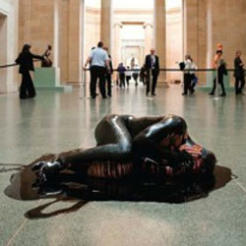Trustees at Tate will soon decide on the future of the organisation’s 21-year relationship with BP after 8,000 Tate members and visitors signed a petition asking for the partnership to be ditched.
At the Tate Members AGM last Friday, director Nicholas Serota was presented with an open letter condemning the environmental impact BP is having worldwide and calling for his organisation to disengage with the oil company, which has been a Tate sponsor since 1990.
Serota said that the views represented in the letter would be passed on to trustees and that a decision about whether or not to extend its relationship with BP “is going to be taken quite soon”.
“The whole question of the support from BP has exercised trustees quite seriously over the past two years,” he said.
“The trustees have recognised that BP has supported the gallery over a 20-year period. They have been in a partnership with BP over that period and have decided not to withdraw from that partnership in the belief that the good that has been done through the money that has come from BP for the gallery, and for the gallery’s public, has been very profound.”
But the campaigning organisations behind the letter, Art not Oil, Liberate Tate and Platform, said that the oil company’s sponsorship has become increasingly unpalatable in light of its recent activities and new information about the cause and impact of climate change.
“When Tate trustees make the decision about whether or not to renew BP sponsorship they need to take into account how much the context has changed in the last two decades since the sponsorship began,” Platform’s Mel Evans said.
“We know that oil companies like BP are chaining us to a dangerously outdated energy model while also actively lobbying to undermine low-carbon legislation. Tate needs to find sponsors that are in keeping with its commitment to sustainability and the human rights agenda.”
Chris Sands of Liberate Tate added: “Maintaining a relationship with an oil company like BP is harming both the reputation of Tate and the experience of enjoying great art in a public gallery.”
Tate's review of the lucrative relationship comes at an inauspicious time for corporate philanthropy to the arts, with the first UK Arts Index released this week showing that corporate giving to the arts fell by 17 per cent between 2007/08 to 2009/10.
Serota has been a leader in the art world on the issue of sustainability and environmental responsibility. Less than a month ago Serota was reported as waging a campaign for other art galleries around the world to reduce their air conditioning and heating so as to reduce their own building’s impact on climate change.
The planned review of the BP relationship comes just a week after the three campaigning organisations launched a publication, Culture Beyond Oil, which was highly critical of the relationship between the oil company and the galleries and in which one of the Tate’s own trustees branded BP “a disgrace”. The three organisations have been waging a long campaign against the partnership, including a choral exorcism of BP's spirit in the Tate Modern's turbine hall and covering naked protestors in fake oil at one of the organisation's summer events this year (as pictured).









